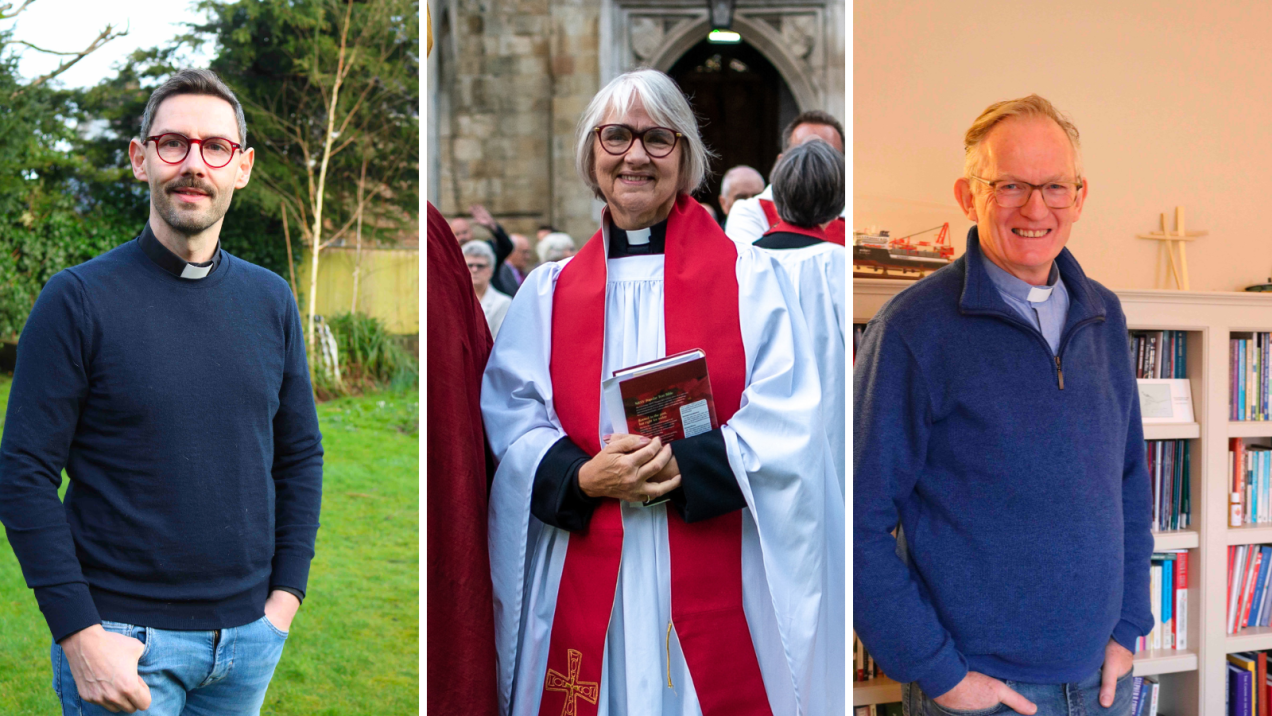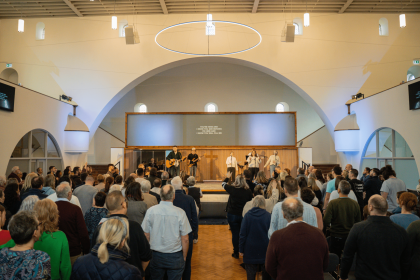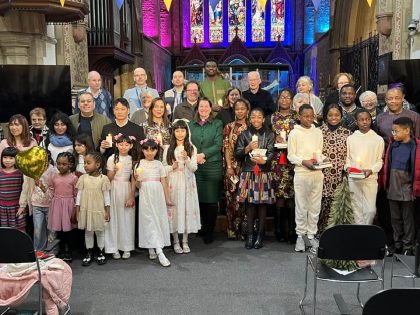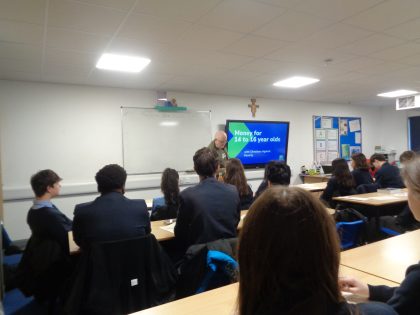Self-supporting ordained ministry is growing in our diocese, particularly amongst those in key leadership positions.
In the Church of England, around one in four ordained ministers are SSMs, offering their ministry on an unpaid basis. They undertake similar roles to paid clergy and come from all walks of life, bringing a wealth of experience into the church and many are deep rooted in their communities. Some have other paid employment but there are many reasons why a minister might choose to be self-supporting.
We hear from three self-supporting ordained ministers in our diocese.
Revd Chris Dudgeon, Rector North Hampshire Downs Benefice

Revd Chris Dudgeon is Rector of the North Hampshire Downs Benefice which is a network of 12 churches. He was ordained in 2018 and tells how God led him on a journey to self- supporting ministry.
Revd Chris became a Christian in his early 20s and attended a large church in London where he met his wife. He studied engineering at university and gained a second degree in offshore engineering before embarking on a career in the oil and gas industry. He then planned to start his own business, with the support of his wife who had experience of running her own firm. They would talk through ideas and pray together.
“Over the course of about 18 months, we went through about eight different ideas and eventually, we hit on one which was very closely aligned with what I had been trained to do. When we prayed about that one, it was like God had screwed some rocket motors on the bottom of it and the idea took off, literally like a rocket. We became more and more excited, more and more convinced that this was what we should be doing.”
He set up an engineering consultancy, advising oil companies all over the world on innovation, research and development.
“It was quite light to start with and then gradually things picked up and over the years it just grew arms and legs. What was exciting about it was right from the start, Pauline and I always thought, God’s the chairman. If he wants us to do this, we’ll follow his lead.”
The business grew and 20 years later had 45 staff with offices in Houston and in Dubai and worked with companies around the world.
After living in Guildford, where the business was based, the couple decided they wanted to relocate to a smaller town where they could engage in the community, and they moved with their children to Odiham 15 years ago. They started worshipping at All Saints and became increasingly involved in church life. Revd Chris joined the PCC and ran an Alpha course. Pauline became churchwarden. They also helped establish a more contemporary service at the church, alongside the more traditional one. Both now have a congregation of around 60 to 70 people each on a Sunday morning.
A short while later Revd Chris sold his consultancy business. “About a month after we sold the business, I just felt my heart completely separating from it all. I came to the conclusion, God must just be saying, that’s the end of that season. Now I’ve got something else for you.”
Through Bishop David, he was encouraged to start exploring ordination and met with other ministers from the diocese.
“As I talked to them and heard a bit about their experiences, I thought ‘Yes, I think that’s me. That’s exactly what I’m feeling, that’s what maybe I’m being equipped to do, maybe this is what God’s been leading me towards for some time’. I felt excited but at the same time, wasn’t sure I felt equipped or qualified, but Bishop David said, ‘don’t worry about that. If this is what God wants you to do, he’ll equip you, he’ll give you everything you need’. So, I started exploring and all the doors then started opening.“
Revd Chris found many of the skills and the experience he had gathered during his career could be used for his new calling. He then had to consider whether to be a stipendiary or non-stipendiary minister.
“I remember Pauline doing a calculation one day and she said, ‘if this is what God wants you to do, then I’ve worked out that he’s effectively paid you in advance’. We’d had this amazing blessing of having sold the business and I didn’t think with hand on heart, I could ask for anymore. So that was how the origins of being self-supporting came about.”
Along with the support of Bishop David, they decided to stay in Odiham as they were well established in the community. Their house is a place of welcome, with regular visitors from the church and community, church groups and Alpha courses.
After training at St Mellitus College, he was ordained in 2018 and did his three-year curacy in Odiham. Towards the end of this time, the vicar of All Saints announced her retirement and Revd Chris was approached by the PCC and Bishop to step into the role in 2021. He became Assistant Rector of the North Hampshire Downs Benefice and is now Rector.
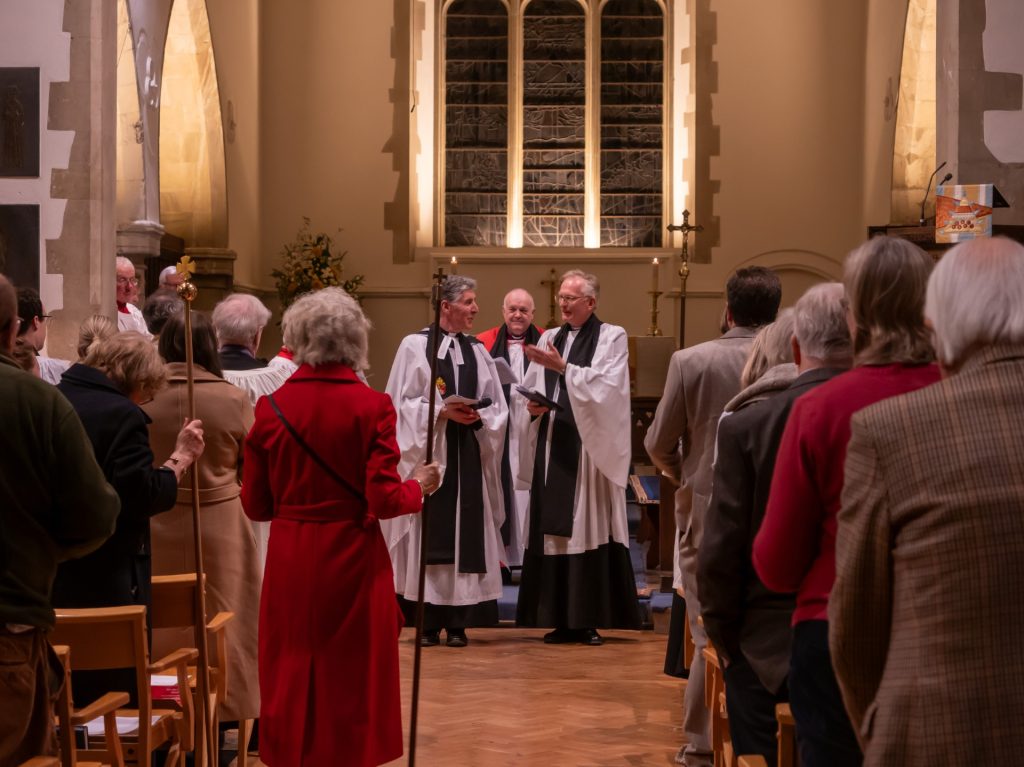
There are nine in the benefice clergy team but this apparently large number comprises of only two stipendiary vicars and one stipendiary curate. One services on a ‘house for duty’ basis, but the other five are all fully self-supporting.
“It’s clear that self-supporting only works for people who are able to afford to be self-supporting but if you look across our team, that’s an amazing variety of situations. One man is a criminal barrister and he does Sunday and a number of hours spread through the week and yet it’s amazing how effective his ministry is. We also have people who are approaching retirement. There’s a whole host of different circumstances why people are able to be self-supporting. Many of us had been living here or working here before stepping up for ordination and so you’re rooted in the community that you’re serving. One of the benefits of being self-supporting is that you know a lot of people and people know you and that can have a real impact for growing the kingdom in the place you live.”
“I think if people know that you’re self-supporting, they are fascinated as well. It makes people stop and think about faith and about motivation and priorities. It’s opened up many conversations about the nature of God’s love for us and the plans he has for us. For me, that’s been very positive. Pauline and I are in this together and see ourselves as a team. We see the joy of the fruits of God’s work here and see close up people coming to faith and lives being transformed.”
Revd Chris wanted to share his story to raise awareness of the importance of self-supporting ministry and challenge the way it is sometimes perceived.
“Self-supporting ministry has enabled us to develop this wonderful team and that’s why I’m keen to rattle the cages for it. The Church of England wants to do more to see God’s Kingdom growing, but at the same time, the resources are probably less. That means you have to have some new strategies and one of those could be more self-supporting ministry. I think there also needs to be a more level playing field in the way people perceive self-supporting ministry. Before I became the rector people thought because I was self-supporting, I was obviously an assistant. We need a culture change and that may happen automatically as self-supporting ministry grows or perhaps, we can put strategies in place to change perceptions to grow this area of ministry.”
Revd Dr Robert Rees, Rector of the Dever Benefice

Revd Rob Rees worked for many years in the further education sector as a senior leader before he started his journey into ordained ministry. He was a lay leader and then curate at the Dever Benefice before becoming the rector 18 months ago.
“Ever since I started to discern a call to ordination, I had a sense that I wasn’t called to full-time stipendiary ministry. By the time I began the process properly, I’d had a well-established career in the education sector, and I still felt called to continue in that work. Most of my work was in colleges of further education (firstly as a lecturer and then in a range of management positions) with people studying for a range of vocational, technical and occupational qualifications. This part of education is often seen as the poor relation (if it is seen at all) and supports students and apprentices from a wide range of socio-economic backgrounds with a wide range of prior educational attainment. So, I knew as I started the process of discernment towards ordained ministry, I would always be exploring what I’d refer to as a dual-vocation. I felt called to continue my work in education and I felt called to be a parish priest and that’s how it’s worked out.”
He now jointly owns an educational-led capital consultancy in Winchester which works in the education sector and employs 20 people.
“That’s where I earn the money that pays the mortgage, but although I am in secular work, I’m a priest 100% of the time. Most of the staff have been on this journey with me. If the logistics dictate, I wear my collar and cassock to work (and it is now quite normal.) We’ve got people in the organisation who are devout Muslims, some who are Catholics and people who have no faith at all but being a priest amongst these people allows me to engage in faith-based conversations on a regular, even daily basis. My role in the workplace also feeds into my ministry with regards to experiences and skills so I see that this dual-vocation, or what I’d refer to as a worker priest, is exactly where I’m called to be. I love being a priest and I love being able to fulfil that in a wider way. There is so much joy in it.”
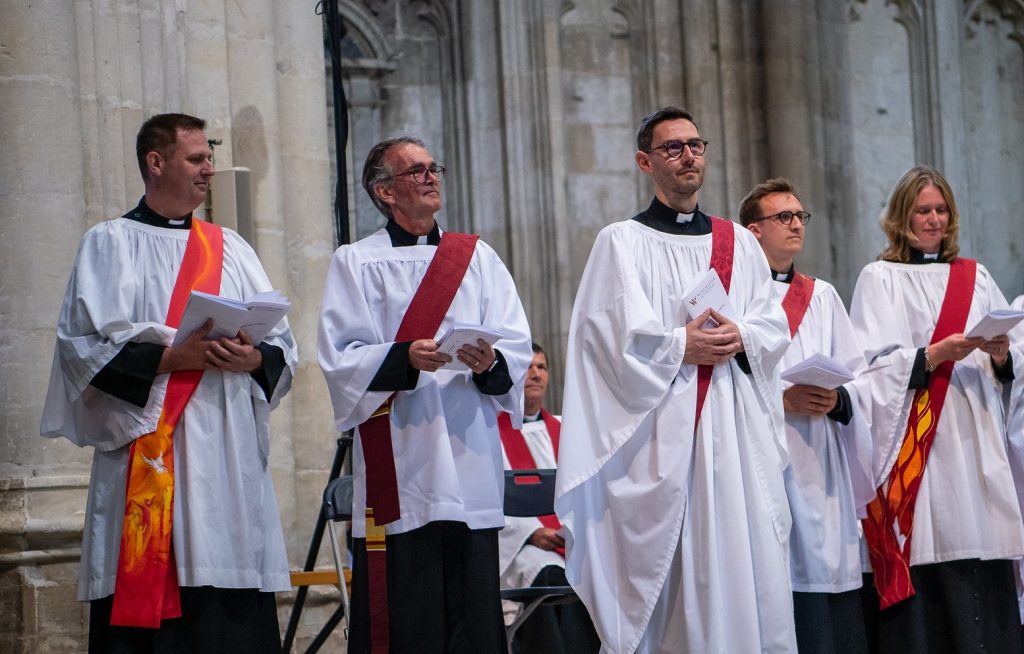
One of the main challenges for Revd Rob is balancing time between his role as a parish priest and rector of the benefice, with work commitments and ensuring he takes his rest day on a Saturday (although this often has to be comprised in weddings and fete seasons). Careful planning of the rota means he is on duty three Sundays out of four and he is supported by a strong ministry team of both ordained and lay leadership.
“When I share with people that I’m a self-supporting rector, I always say at the outset that it’s my choice, because I think some people can interpret that you are self-supporting because the diocese wants to save money or that it’s a plug in some financial crisis. The idea of having a self-supporting rector is very new. So, when I was appointed, I had to write my own statement of particulars. My starting point was to say, as a self-supporter, this is what I can offer to ministry which makes it manageable for me, for my family and for the church. I also think there are opportunities for self-supporting ministry to be recognised at every level within the church, a self-supporting archdeacon, self-supporting bishop, self-supporting dean of a cathedral. There might be some practicalities about why you can’t be self-supporting in some job roles, but I think that there should and could be a growth in all aspects of ministry, so that people who discern a call to a particular role and who want to offer that on a self-supporting basis could do so.”
Revd Rob has also been appointed as the Bishop’s Officer for Self-Supporting Ministry and is planning a study day for self-supporting ministers in the Summer to explore the balance between their secular work and their ministry, and how the church can support this. He is also assistant diocesan director of ordinands and supports candidates through the discernment process towards stage 2. He gives time to the Cathedral with 2 or 3 weekday services each month (the cathedral being next to his secular office.)
“I think there is a growth and joy and a realisation that priests who have another, often secular, job bring a different dimension to the church. This isn’t to replace or compete or take away from those in stipendiary ministry (who often come with a wealth of experience); we are there to work alongside our brother and sister priests as ambassadors for Christ wherever it is we are. I think the Church of England does and could benefit further from that, from those professional experiences and access to places outside of the parish structure we as self-supporting priests also operate. I think people can perceive the self-supporting ministry is a cheaper alternative, but I think there’s a richness that comes with self-supporting ministry that can only benefit Christ’s Church of England and I am thankful to God for the gifts that he has generously gifted to me that enable me to fulfil my role as a worker priest.”
Revd Karen West, Vicar of St Mary the Virgin, Silchester

Revd Karen West first had the sense that God was calling her to ordained ministry more than 20 years ago as she approached what she called a ‘landmark birthday’. At the time, she had been working at The National School of Government for several years.
She went through to selection but at the bishop’s panel, Revd Karen explains “the answer was no, not no never, but no not at the moment and on reflection it was absolutely the right decision. It was a difficult time of my life. My marriage had ended very suddenly, and I just had cancer diagnosed. I’m glad it happened really in lots of ways because I then moved to a different part of the organisation, had an amazing 10 years travelling around the world, working on short and longer term assignments in developing countries and post-conflict environments and in other locations important to the UK – all of which experience has added to what I bring to ordained ministry.”
In 2009, coming up to another big birthday she became Archbishops’ Adviser on Bishops’ Ministry based at Lambeth Palace to support the learning and development of Bishops in the Church of England, a job that combined her passion for learning and her faith. A role she took on for six years.
Revd Karen attended church in Sherfield on Loddon and took on more responsibilities as at the time the church had no rector.
“I suppose that was the time when I sensed that God was calling again but I was in my mid 50s and I thought I was too old to train for ordained ministry. So, I started training as a lay minister but, during the first year of study, I felt God was telling me to do more. It took a lot of persuading actually! I remember going on retreat and saying to God ‘I just need a simple yes or no, have I got to go through this process again?’ The answer was yes and so I swapped paths.”
Revd Karen trained while at Sherfield on Loddon and stayed there for her curacy. Revd Karen was ordained as a deacon in 2021 and priest in 2022. She moved to Silchester 18 months ago and she took the post of self-supporting resident vicar. She lives in the parish house in the village with her Mum and cocker spaniel Monty.
“I think it’s good that a self-supporting minister can still have a post of responsibility. I think that it’s quite important to feel that you have some autonomy and some authority even though you’re not paid to do it. I think it’s about being able to put into practice all your training. I’m given the same ordination, I make the same promises, I’ve been given the same authority by the bishop.”
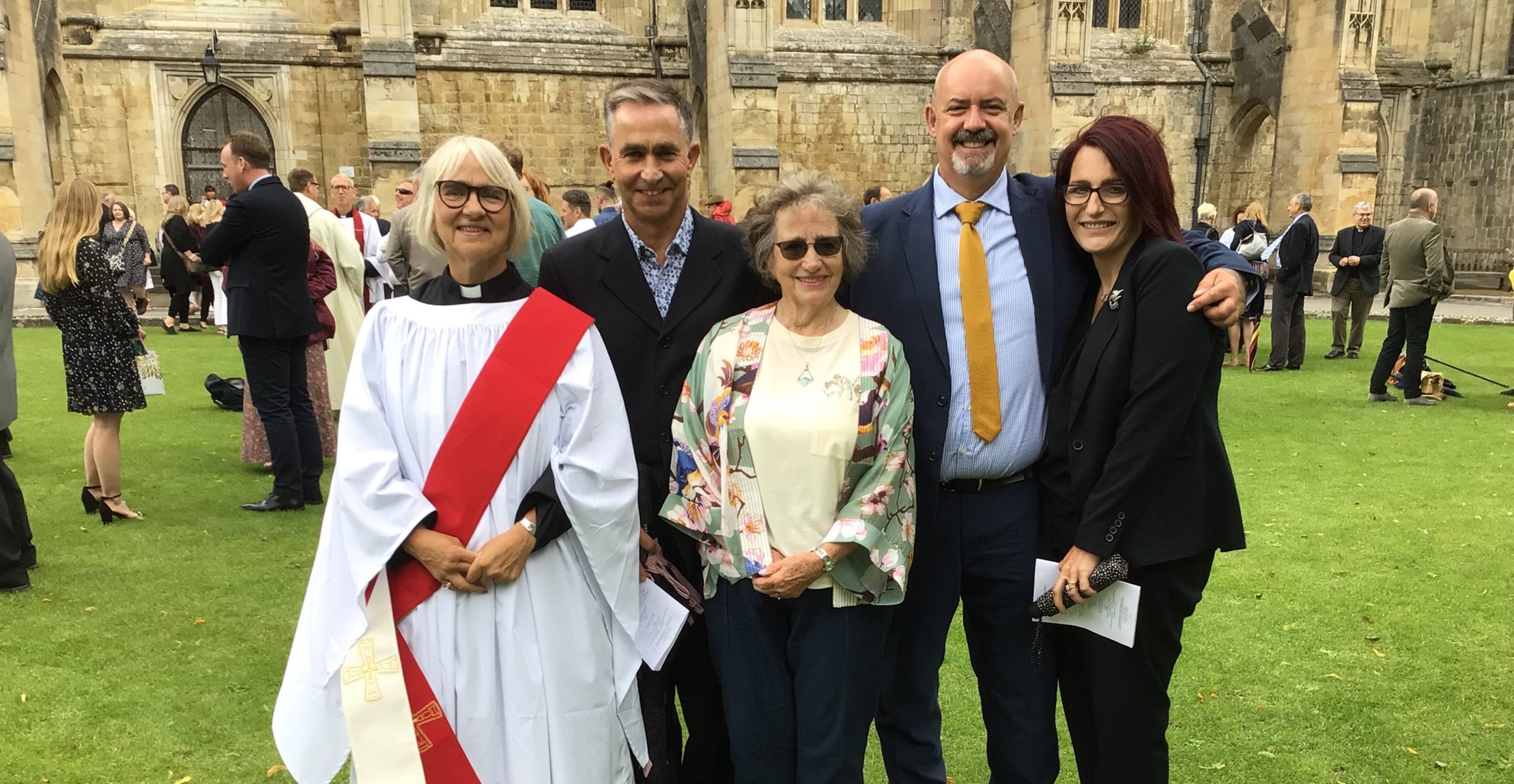
“If the Church of England is going to have to continue to depend on self-supporting ministers, in order to survive financially, we want people to have fulfilling roles. You’ve got an amazing array of talent amongst the self-supporting minister pool, people who will have done amazing things before their ordination and you don’t want those to be wasted.”
Revd Karen says she is fortunate to have a civil service pension and so is able to support herself financially and offer time to the church. She is contracted to work three days a week but regularly gives more. As well as vicar of Silchester, she is also involved in ministry across the benefice in Tadley and Pamber Heath.
As well as her church commitments she is a trustee and board member of the Church Army and a member of the chaplaincy team at St Michael’s Hospice. “I’m very conscious that I cost quite a lot of money to train and so I want to make sure that I’m giving back the equivalent worth of the investment that’s been made in me.”
“Just thinking about it, I am genuinely glad that the answer was no, 28 years ago. I know that I am a much better minister now because of my experiences in those intervening years. By dint of being able to be a self-supporting minister, you’ve had other experiences and skills first. You can’t learn everything, even in three years of training and three years of curacy but all that has happened in my life, through my work, through personal circumstances, have enabled me. So, there’s a lot of wisdom and experience that should be available and used for the good of ministry.”
“I love what I’m doing and it is incredibly fulfilling. Being part of this community is the most amazing privilege and I’m so thankful that I’ve been able to afford to do it. I feel like an equal member of the team, even though I’m only part time in theory. I feel very appreciated here. I had a good job in the civil service and the pension scheme in those days was good. It feels like a real gift and it’s good to have been able to offer some of that back.”

